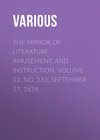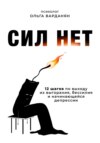Читать книгу: «The Mirror of Literature, Amusement, and Instruction. Volume 12, No. 333, September 27, 1828», страница 2
(Plain chant.)
"Over thy head I ring this bell,
[Rings the bell,
Because thou art an infidel,
And such I know thee by thy smell.
CHORUS
With a hoccius proxius mandamus,
Let no vengeance light on him,
And so call upon him."
Supper was then served up, at the moderate charge of one shilling a head, exclusive of beer and liquors. The cloth being cleared, the smokers ranged themselves round the fire, and kept up the meeting with mirth and harmony, till all retired and were lulled to anticipating dreams of the profits of the coming day, to which they woke with the sun, cheerful and unenvious of each other's success. Such was Stirbitch fair some sixty years ago, as witnessed by
Your constant reader,Σηνυα
NOTES ON NORTHERN LITERATURE
(For the Mirror.)
Tordenskiold is a name frequently met with in the annals of Denmark. A singular anecdote is connected with one of the bravest individuals who ever bore the name—the renowned Admiral Tordenskiold, of the days of Frederick IV. While he was yet a young and undistinguished naval officer, he chanced to be in the hall of the royal palace at the time that the king, wearied with the flatteries of some courtiers, who were congratulating him on the success of his war with Sweden, exclaimed, "Ay, I know what you will say, but I should like to know the opinion of the Swedes themselves." Tordenskiold slipped unobserved from the royal palace, hurried to his ship, set sail, and was in an hour on the coast of Sweden. The first sight that caught his eye on landing was a bridal procession. Hastily seizing bride, bridegroom, minister, peasants, and all, he hurried them aboard, and returned to Denmark. Two hours had scarcely elapsed from the moment of the king's expressing his wish, when Tordenskiold, stepping from the crowd of courtiers who surrounded his majesty, informed him that he had now an excellent opportunity of gratifying his wishes, as Swedes of every class of society were in waiting. The astonished monarch, who had not yet missed the young captain from the hall, demanded his meaning; and on being informed of the adventure, summoned the captives to his presence. After gratifying his curiosity, he dismissed them with a handsome present, and ordered them to be conveyed back to Sweden. The promptness of young Tordenskiold was not forgotten, and he speedily rose to the high admiralship of Denmark, a post which he filled with more glory than any other of his countrymen, either before or since.
The memoirs of Lewis Holberg, which have lately appeared in English, are remarkably curious and interesting. It is not generally known, that this celebrated writer, the Moliere of Denmark, was educated at Oxford, whither he repaired penniless, to secure a good education.
Holberg, Samsoe, and Oehlenschlager are the three dramatic luminaries of Denmark. The best production of Samsoe is the play of Dyveke, produced a few days after his death. Such was the enthusiasm it excited, that the following epitaph was proposed to be inscribed on his tomb, in the public cemetery of Copenhagen:—
"Here lies Samsoe;
He wrote Dyveke and died."
The best poet that Sweden has ever produced is Esaias Tegner, the bishop of Wexio, now living. His first production was Axel, a short poem on the adventures of one of those pages of Charles XII. who were sworn to a single life, to be entirely devoted to the fortunes of war. He has struck out great interest by plunging this hero in love, and painting the conflicts between his passion and his reverence for his oath. The words have been translated into Danish, German, and English. The latter translation appeared in Blackwood's Magazine. Although the Danish language is so akin to the Swedish, that translation is the worst of the three. It is said that this poem procured Tegner the bishoprick of Wexio. A singular circumstance is connected with it. A German literary gentleman was so delighted with the version of it in his own language, that he actually studied Swedish for the sole purpose of reading it in the original.
A compliment like this has rarely been paid, as the poem does not contain more than about a thousand lines. Since then, Tegner has written a poem, entitled Frethioff's Sage founded on one of the wild and singular traditions of the North. It has been more popular than even Axel, and the announcement of a third poem from the same hand, said to outdo all former efforts, excites the greatest interest in Stockholm.
Novels have only been introduced within these few years in Denmark. Ingemann is their most successful manufacturer. His last production is entitled Valdemar Seier, or Waldemar the victorious. The Danes have translations of Sir Walter Scott and Cooper.
It is supposed there are not above three persons in Copenhagen who cannot speak German. Oehlenschlager, the best modern author of Denmark, writes equally well in German and Danish.
ANGLO-SVECUS
PLEASURES OF SNUFF-TAKING
Let some the joys of Bacchus praise,
The vast delights which he conveys,
And pride them in their wine;
Let others choose the nice morceau,
The piquant joys of feasting know,
But other gifts are mine.
Give me, ye gods, my quantum suff.
Of Grimstone's or Gillespie's snuff—
These are the sorts I crave;
Defend me from the Lundyfoot,
'Tis to my nostrils worse than soot,
And from the Irish save.
Your Prince's Mixture I despise,
It clogs the head and dims the eyes—
The nose rejects such burden;
Sure 'tis the critic's vast delight,
So dull and stupidly they write,
I call for witness –.
Oh! where shall I for courage fly?
Or what restorative apply?
A pinch be my resource;
Perchance the French are not polite,
And with my country wish to fight,
Then I must grieve perforce;
Or, if with doubt the bosom heaves.
The heart for Grecian sorrows grieves,
And pines to see them fail.
Such critics sometimes court the muse,
And I perchance the rhymes peruse,
Then heaves the breast with pain.
To soothe the mind in such an hour,
A pinch of snuff has ample power—
One pinch—all's well again.
A pinch of snuff delights again,
And makes me view with great disdain,
And soothes my patriot grief.
Thus for the list of human woes,
The pangs each mortal bosom knows,
I find in snuff relief:
It makes me feel less sense of sorrow,
When modern bards their verses borrow,
And soothes my patriot grief.
Then let me sing the praise of snuff—
Give me, ye gods, I pray, enough—
Let others boast their wine;
Let some prefer the nice morceau
And piquant joys of feasting know,
The bliss of snuff be mine.
ODE ON A COLLEGE FEAST DAY
(For the Mirror.)
Hark! hear ye not yon footsteps dread
That shook the hall with thundering tread?
With eager haste,
The fellows past.
Each intent on direful work.
High lifts the mighty blade and points the deadly fork!
But hark! the portals sound and pacing forth,
With steps, alas! too slow,
The college gips of high illustrious worth
With all the dishes in long order go;
In the midst, a form divine,
Appears the fam'd Sir-loin;
And soon with plums and glory crown'd,
A mighty pudding sheds its sweets around.
Heard ye the din of dinner bray?
Knife to fork, and fork to knife:
Unnumber'd heroes through the glorious strife,
Through fish, flesh, pies, and puddings cut their destin'd way.
See, beneath the mighty blade,
Gor'd with many a ghastly wound,
Low the fam'd Sir-loin is laid,
And sinks in many a gulph profound.
Arise, arise, ye sons of glory,
Pies and puddings stand before ye;
See, the ghosts of hungry bellies
Point at yonder stand of jellies;
While such dainties are beside ye.
Snatch the goods the gods provide ye:
Mighty rulers of this state,
Snatch before it be too late,
For, swift as thought, the puddings, jellies, pies,
Contract their giant bulks, and shrink to pigmy size.
From the table now retreating,
All around the fire they meet,
And, with wine, the sons of eating,
Crown, at length, the mighty treat:
Triumphant plenty's rosy graces
Sparkle in their jolly faces:
And mirth and cheerfulness are seen
In each countenance serene.
Fill high the sparkling glass,
And drink the accustom'd toast;
Drink deep, ye mighty host,
And let the bottle pass.
Begin, begin, the jovial strain,
Fill, fill, the mystic bowl,
And drink, and drink, and drink again,
For drinking fires the soul
But soon, too soon, with one accord they reel
Each on his seat begins to nod.
All conquering Bacchus' power they feel,
And pour libations to the jolly god.
At length with dinner, and with wine oppressed,
Down in their chairs they sink, and give themselves to rest.
HUGH DELMORE
THE TOPOGRAPHER
VISIT TO MATLOCK BATHS
(For the Mirror.)
It was on a fine evening in autumn, when the rays of departing day began to glimmer in the west, and twilight had just spread her dusky gloom. All was silent, save the low rushing of the Derwent stream, purling its way through dense groves, and winding round the stupendous rock of Matlock's Vale. As I paced along, the grave, sombre hue of evening fell full on the rocks, which rose in magnificent grandeur, and seemed to look with contempt on all around them. These beauties, combined with the gray tint of the stone, the cawing of the rooks, which nestle in the crevices and underwood, with now and then the screeching of the night-owl,—were such as would make the most cold and indifferent acknowledge the delight to be enjoyed in the silent walks of nature.
Perhaps among all the varied scenery in the north of England, none is more sublime than that of Matlock; whose romantic range, interspersed with some of the finest touches of art, forms an interesting contrast. The road from the village to the Baths is as diversified as sublime. It is situated in the bosom of a deep vale; here, on one side, rocks or crags, tower above you to the height of two hundred feet; at the base they form, a graceful slant, which is covered with thick, clustering foliage. On the summit, verdure is seen; and sometimes sheep, unconscious of their danger, will stray, and nip the grass from the very edge. Beneath flows the river Derwent, now, in rapid, though solemn state, reminding us of the peaceful stream of life—but only in fictitious calm, luring on to its more ruffled scenes; next, a rushing noise reminds you a cataract is near, which, combined with the rustling of the foliage by the breeze, wakens the mind to gratifying contemplation. The other side is bounded by immense hills, which have a gradual ascent. Along the regular connexion of the road are cottages, whose symmetry adds the charm of artificial embellishment to this luxuriant display of nature. Here you perceive a sumptuous villa; a little farther, a simple cot, where nature has displayed her master-hand: but the most charming group is where three rows of cottages rise in regular succession towards the summit of the hill, their gardens contrasting with the barren appearance of their opposite neighbours. These delightful scenes alternate until your arrival at the Baths.
The Baths are situated about one mile from the village of Matlock, and are a collection of lodging-houses, which, during the summer season, are usually occupied. The baths are filled by springs, which issue in great abundance from limestone rocks; the water is exceedingly clear, and bears a temperature of 68° Fahrenheit. Here are the wells which produce the petrifactions; any substance placed in them being, in the course of a few months, covered with stone. Visiters are in the habit of leaving various articles, which, by the ensuing season, thus become incrusted. Birds' nests with eggs in them, baskets, shoes, &c. &c. are among the articles which may be seen here.
Matlock abounds with subterraneous caverns, which excite the surprise and admiration of strangers. These are entered by a passage, formed with immense labour through the solid rock. In the interior you are surrounded by brilliant crystallizations, various kinds of metallic ores, spars, &c., with petrifactions hanging from the roof, pendent as icicles. The roofs of the numerous caves are of different descriptions; some have the appearance of arches formed by the hand of man, others appear to be immense masses of rock, which have fallen into their present situation by chance, or through some violent convulsion of the earth, by which they have been disjointed and separated. In several of them there are fine springs of limpid water. Here are likewise several productive lead mines.
At the Museum the most interesting productions of the Peak are to be seen. Many of the specimens are manufactured into vases, copied from the antique. Besides the natural productions of the place, there are a great variety of fine alabaster vases from Florence, with statues of various kinds of Italian marble. Immediately facing the museum are the gardens, called the Museum Gardens, in which are several grottoes, curiously ornamented. Perched upon a rock, just at the entrance, is a fine venerable hawk, of the bustard species, which was winged about four years ago, and took its station there, from which spot it rarely moves.
The Botanical Gardens, belonging to Mr. Bownes, are much visited, and contain nearly seven hundred indigenous plants. They are situated along the rise of the hill, known by the name of the Heights of Abraham, from the summit of which can be enjoyed the most extensive views of the scenery round Matlock.





















